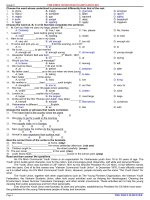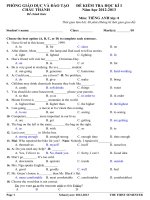- Trang chủ >>
- Đề thi >>
- Đề thi lớp 9
Đề ôn thi học sinh giỏi tiếng Anh lớp 9 số 5
Bạn đang xem bản rút gọn của tài liệu. Xem và tải ngay bản đầy đủ của tài liệu tại đây (170.94 KB, 2 trang )
SỞ GD&ĐT………
KÌ THI HSG LỚP 9 NĂM HỌC:….
ĐỀ CHÍNH THỨC
KÌ THI CHỌN HSG LỚP 9 NĂM HỌC 201…-201…
ĐỀ THI MÔN: TIẾNG ANH
Thời gian: 150 phút (không kể thời gian giao đề)
Câu I (1,0 điểm): Trong các từ sau, tìm 4 từ có phần gạch chân được phát âm là /e/.
pen Me key many
teacher Test seven cat
Câu II (1,5 điểm): Viết dạng đúng của các động từ trong ngoặc để hoàn thành các câu sau.
1. There (be) … are…. 20 students in class 9A. They are learning English now.
2. When I (arrive) … arrived…. yesterday, he was watching TV.
3. They (live) … have lived/been living…. here since 2003.
4. My brother likes (play) ……playing/ to play…. soccer in his free time.
5. The boy is too young (ride) ……to ride……. a motorbike.
6. A modern hospital should (build) ……should be built…. in this town soon.
Câu III (2,0 điểm): Tìm 1 lỗi sai trong 4 từ được gạch chân ở mỗi câu sau và sửa lại bằng 1 từ thích hợp.
1. Hello, I name is Linda and I’m a student from the USA. I
my
2. The last time I went to London was at September. at
in/ before/ after (last)
3. My father often spends a hour working in the garden every day. a
an/ one/ 1
4. Jane is only 10 years old but she cooks very good. good
well/ (hoặc một trạng từ thích hợp )
Câu IV (1,0 điểm): Chọn 1 từ thích hợp trong bảng để điền vào mỗi chỗ trống của đoạn văn dưới đây.
can did So
on any Than
Many tourists like to send postcards to their friends and family. They send them when they are (1) on
holiday. These postcards often have pictures on one side and a message (2) can be written on the other.
The pictures on them are better (3) than the photos they take. The first postcards were sent at the end
of the nineteenth century. There was a picture of a town on them. Later on, they had pictures showing
important events. People liked to see them because there were not (4) any pictures in the newspapers
then.
Câu V (2,0 điểm): Đọc đoạn văn và trả lời các câu hỏi sau.
Cornwall is situated in the south-west of England. It is famous for its beautiful scenery. There is
not much industry so many people still earn their living by fishing. Another important source of income
is tourism. There are a lot of tea-shops, souvenir shops and above all "bed and breakfast". You can see
signs for these small hotels everywhere. Most of them are pretty houses or bungalows with nice
gardens and they are run by family who lives there. Cornwall is also well-known for its history and
legends. For example, in Titagel you can visit the ruins of King Arthur's Castle where King Arthur is said
to have sat with his knights at the famous round table. Tourists often come to visit Cornwall in summer
because the weather is warm and sunny.
1. Where is Cornwall situated? Cornwall is / It is (situated) in the south-west of England / in England.
2. Why do many people still earn their living by fishing? the south-west of England/ England./ (Many
people still earn their living by fishing) because there is not much industry./ There is not much industry so
many people still earn their living by fishing./ Because there is not much industry so many people still earn
their living by fishing.
3. Who are the hotels run by? The hotels/ They are run by family who live(s) there/ living there./ Most of
them are pretty houses or bungalows with nice gardens and they are run by family who live(s) there.
4. What is the weather like in Cornwall in summer? The weather / It is warm and sunny./ The weather is /
It is warm./ The weather is / It is sunny./ (Tourists often come to visit Cornwall in summer) because the
weather is warm and sunny.
Câu VI (2,5 điểm): Viết lại các câu sau sao cho nghĩa không thay đổi, bắt đầu bằng cụm từ cho sẵn.
1. They clean this room everyday. This room is cleaned (by them) everyday (by them)
2. Mary is taller than Anne. Anne is not as tall as Mary (is).
3. Why don’t we watch a film now? What about watching a film now?
4. “Would you like to have some coffee?”, said Tom to Mary.
Tom invited Mary (to have / to drink) some coffee
5. I cannot remember the man’s name. He phoned me last night.
PREPARED & RELEASED BY ĐỖ BÌNH, THPT LIỄN SƠN, LẬP THẠCH, VĨNH PHÚC – www.violet.vn/quocbinh72
The man whose name I cannot remember / forget phoned me last night.
HẾT.
Họ và tên thí sinh: ……………………… …… Số báo danh: …………… ……
PREPARED & RELEASED BY ĐỖ BÌNH, THPT LIỄN SƠN, LẬP THẠCH, VĨNH PHÚC – www.violet.vn/quocbinh72









